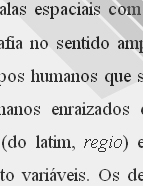

................................
Coimbra: Palimage, 2010; NETO, M. S. – “Historiografia Rural Portuguesa”, Studia Historica . Historia Moderna , 29, 2007, pp. 251-275; OLIVEIRA, António – “Das história das pátrias à história local”. In A Cidade e o Campo. Colectânea de Estudos. Coimbra: Centro de História da Sociedade e da Cultura, 2000, p. 11-22; OLIVEIRA, António – “Problemática da história local” In O Faial e a periferia açoriana nos séculos XV a XX . Actas do colóquio realizado nas ilhas do Faial e Pico de 10 a 13 de Maio de 1993. Hora: Núcleo Cultural da Horta, 1995, p. 11-29; PEREIRA, António dos Santos – “Historiografia do interior beirão: notas do passado e projetos do presente”. In Maia. História Regional e local . II. Actas do Congresso. Maia: Câmara Municipal da Maia, 1999, p. 175-186; POINSARD, Léon - O estudo dos agrupamentos sociaes pelo methodo monographico segundo F. Le Play e H. de Tourville: noticia seguida do quadro de classificação dos factos sociaes de H. de Tourville e dum ensaio de classificação das sociedades segundo Demolins . Coimbra: Imprensa Academica, 1909; SILVA, Armando B. Malheiro da – “O Minho nas Monografias (sécs. XIX-XX). Notas para uma revisão sistemática dos estudos locais”. Bracara Augusta . Revista Cultural de Regionalismo e História da Câmara Municipal de Braga, nº. 94-95, 1991/92, p. 27-96; SILVA, Augusto Santos – “Os lugares vistos de dentro: estudos e estudiosos locais do século XIX português”. Revista Lusitana (Nova série). 13-14, 1995, p. 69-95; SILVA, Manuel da - “Schema d’historia local”. Revista de História II, Lisboa, 1913, p. 182-183; TEIXEIRA, Manuel C. - “A História Urbana em Portugal. Desenvolvimentos recentes”. Análise Social , vol. XXVIII (121), 1993 (2º), p. 371-390; TENGARRINHA, José – “Historiografia dos estudos históricos locais”. In Perspectivas de historia local: Galicia y Portugal . Joseba Agirreazkuenaga, Mikel Urquijo (eds.). Bilbao: Universidad del País Vasco, 1996, p. 29-48; TORGAL, Luís Reis – “História… Que História? Algumas reflexões introdutórias à temática da história regional e local.” Revista da História das Ideias . Coimbra: Universidade de Coimbra, 1987.
Maria Isabel João
This work is financed by national funds through FCT - Foundation for Science and Technology, I.P, in the scope of the projects UIDB/04311/2020 and UIDP/04311/2020.
